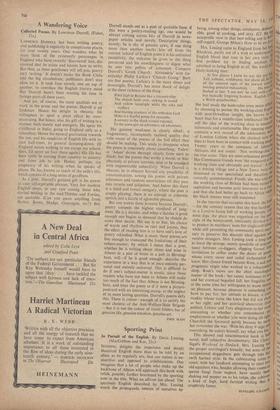A Wandering Voice
Collected Poems. By Lawrence Durrell. (Faber, 21s.)
LAWRENCE DURRELL has been writing poetry, and publishing it regularly in conspicuous places, for over twenty years. One wonders what he must think of the reviewerly personages in England who have recently `discovered' him, dis- covered that he exists and knows how to write. But then, as these gentlemen will tell you, poetry isn't `writing.' It doesn't make the Book Clubs and the big circulations; publishers don't stay alive on it. It took four novels, one on top of another, to convince the English literary mind that Durrell hasn't been wasting his time in foreign parts all these years.
And yet, of course, the same qualities are at work in the prose and the poems. Durrell is an Irishman. Hence his delight in rhetoric, his willingness to spoil a plain effect by over- decorating. But hence, also, his gift of writing in a manner both stately and energetic. He spent his childhood in India, going to England only as a schoolboy. Hence his natural gravitation towards the sun, and his suspicion of English life with its cool half-tones, its general damping-down. (If England meant nothing to me except my school- days, I'd never set foot there again.) His life has been spent in moving from country to country and from job to job. Hence, perhaps, the poignancy of his writing when he speaks of places. He has, known so much of the exile's life, which consists of a long series of goodbyes.
As a poet. Durrell's greatest gift is his power to coin unforgettable phrases. Very few modern English poets, at any rate among those who started .Writing in the mid-Thirties and Forties, are quotable. (Can you quote anything from Barker, Raine, Madge, Gascoigne, etc?) But Durrell stands out as a poet of quotable lines; if this were a poetry-reading age, one would be always coming across bits of Durrell in news- paper articles and novels. Descriptive things, mostly; he is shy of gnomic saws; if one thing more than another marks him off from the current 'school' of English poets it is his unlimited receptivity, the welcome he gives to the thing perceived and his unwillingness to digest what he sees into pellets of comment. Compare Durrell's 'Greek Church: Alexandria' with (in- evitably) Philip Larkin's 'Church Going.' Both are fine poems; Larkin's is the more direct and downright, Durrell's has more shock of delight at the sheer richness of the thing :
Piled high in Byzane like a treasure-ship The church heels over, sinking in sound And yellow lamplight while the arks and trolleys And blazing crockery of the orthodox God Make it a fearful pomp for peasants, A sorcery to the black-coated rational, To the town-girl an adventure, an adventure.
His greatest weakness is closely allied: a fragmentary, incompletely realised quality that robs many of the poems of the full effect they should be making. This tends to disappear when the poem is concretely about something; 'Fahre' or 'Adam' drives through clearly from start to finish; but the poems that evoke a mood, or hint obscurely at private sorrows, tend to be smudged with impenetrable subjectivity. When Durrell is obscure, he is obscure beyond any possibility of communication, sowing his poems with private references and random associations till they pass into reverie and solipsism. And below this there is a third and lowest category, where the poet is simply playing; there is no attemPt at coherent speech, just a dazzle of agreeable phrases.
But one makes these protests because Durrell's poetry compels the highest standard of judg- ment. He is a dazzler, and when a dazzler is good enough one begins to demand that he should do more than dazzle. His ear is so fine, his choice of words and rhythms so rare and joyous, that the effect of reading him is to have one's love of poetry rekindled. What is more, these poems are fine enough to transcend the limitations of their subject-matter; by which I mean that a poet, whether he is writing about olives and wine in Athens or a pint of bitter in a pub in Birming- ham, will—if he is good enough—describe the experience in a way that is at once entirely per- sonal and entirely universal. This is difficult to do if one's subject-matter is exotic, since those readers who have not been to Athens will make too much of the fact that Athens is not Birming- ham, and treat the poem as if it, were a picture- postcard with an interesting stamp, to the neglect of its more lasting qualities. Durrell's poems defy this. There is colour—enough of it to satisfy the most choleric of the Anti-Welfare-State Brigade —but it is not the colour of travel folders but of genuine life, genuine emotion, genuine art.
JOHN WAIN






































 Previous page
Previous page